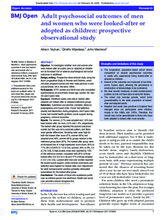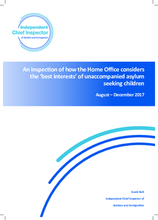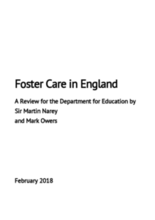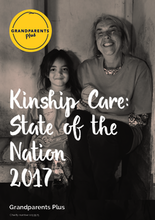Displaying 821 - 830 of 1177
The objective of this study was to investigate whether men and women who were looked-after (in public care) or adopted as children are at increased risk of adverse psychological and social outcomes in adulthood.
This inspection by the Independent Chief Inspector of Borders and Immigration in the UK examined how the Home Office considers the ‘best interests’ of unaccompanied asylum seeking children.
This paper presents a community based participatory research project, which adopted a photovoice approach with seven unaccompanied asylum-seeking children (UASC) living in foster care in the United Kingdom.
This review analyzes and critiques the foster care system in England, offering recommendations for improving the system.
This report is based on a survey of members of the Grandparents Plus Kinship Care Support Network, which includes almost 4,000 kinship carers in the UK.
This study evaluates the ‘Nurturing Attachment’ program in the UK, a Dyadic Developmental Psychotherapy intervention for adoptive families.
In this piece, Robert Halfon, the Chair of the UK Parliament's Education Select Committee, writes that England's foster care system is failing vulnerable children.
This article, based on a unique mixed‐methods study of social work interventions in the UK and the influence of poverty, highlights a narrative from practitioners that argues that, as many poor families do not harm their children, it is stigmatizing to discuss a link between poverty and child abuse and neglect.
This chapter from 'New Directions in Children’s Welfare' applies the theorising emerging from mobilities discourses and applies them to children’s services.
This chapter from 'New Directions in Children’s Welfare' aims to discover the delicate dynamics of trust within the specific professional and service user relations in work with children and young people who are either Looked After or at risk of significant harm.




